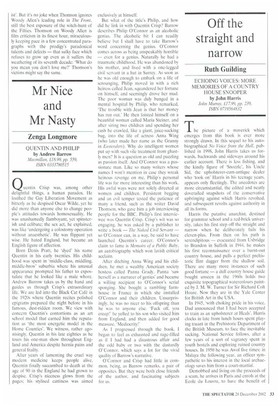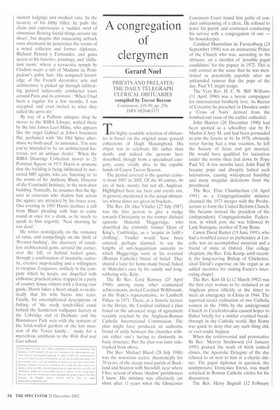Off the straight and narrow
Ruth Guilding
ECHOING VOICES: MORE MEMORIES OF A COUNTRY HOUSE SNOOPER by John Harris John Murray, £17.99, pp. 239, ISBN 0719564832 The picture of a maverick which emerges from this book is ever more strongly drawn. In this sequel to his autobiographical No Voice from the Hall, published in 1998, John Harris takes us forwards, backwards and sideways around his earlier account. There is less fishing, and the kindly figure of 'Snozzle', his Uncle Sid, the upholsterer-cum-antique dealer who 'took on' Harris in his teenage years, appears only fleetingly. The anecdotes are more circumstantial, the edited and neatly dovetailed snapshots of the conservative upbringing against which Harris revolted, and subsequent revolts against authority in all its forms.
Harris the putative anarchist, destined for grammar school and a red-brick university, takes his first step off the straight and narrow when he deliberately fails his eleven-plus. From then on his path is serendipitous — evacuated from Uxbridge to Brandon in Suffolk in 1944, he makes his first reconnaissance over a burnt-out country house, and pulls a perfect prehistoric flint dagger from the shallow soil. There are many more instances of such good fortune — a dull country house guide bought unseen in the 1960s holds two exquisite topographical watercolours painted by J. M. W. Turner for Sir Richard Colt Hoare. Now they are in the Yale Center for British Art in the USA.
In 1945, 'with choking pride in his voice, Dad announced that I had been accepted to train as an upholsterer at Heals'. Harris clocks in late from lunch hours spent playing truant in the Prehistoric Department of the British Museum, to face the inevitable sacking. National Service follows, after a few years of a sort of vagrancy spent in youth hostels and exploring ruined country houses. In 1950 he was Awol five times; in Malaya the following year. an officer sympathetic to his interest in the local archaeology saves him from a court-martial.
Demobbed and living on the proceeds of a scam, he arrives in Paris and enrols at the Ecole du Louvre, to have the benefit of
student lodgings and medical care. In the lavatory, of his filthy billet, he pulls the chain and experiences a 'sudden swirl of obnoxious floating foetid things around my shoes', but despite this nauseating setback soon afterwards he penetrates the rooms of a noted collector and former diplomat, Richard Penard y Fernandez, and gains access to his boiseries, paintings, and 'titillation room,' where a terracotta nymph by Clodion wears a tuft of Madame de Pompadour's pubic hair. His nonpareil knowledge of the French decorative arts and architecture is picked up through infiltrating genteel ladies-only conducted tours around Paris and its environs : 'When I had been a regular for a few months. I was accepted, and even invited to what they called the apres-the.'
By way of a Fulham antiques shop he moves to the RIBA Library, wafted there by the late James Lees-Milne, who appears like the angel Gabriel at John's basement flat, perfumed with 'the Old Spice aftershave we both used', to announce, `11'm sure you're intended to be an architectural historian, not an antique dealer.' When the RIBA Drawings Collection moves to 21 Portman Square in 1971 Harris is unaware that the building is being infiltrated by nocturnal MIS agents, who are 'listening in' to the rooms of Sir Anthony Blunt, Director of the Courtauld Institute, in the next-door building. Naturally, he assumes that the figures in raincoats who shadow him across the square are attracted by his beaux yeux. One evening in 1983 Harris declines a call from Blunt pleading with him to come round at once for a drink, as he needs to speak to him urgently. 'Next morning he was dead.'
He writes nostalgically on the romance of ruins, and compellingly on the thrill of 'Pevsner-bashing', the discovery of countless architectural gems, around the corner. over the hill, or behind locked gates, through a combination of insatiable curiosity, creative map-reading and a willingness to trespass. Longueurs, unlikely in the company which he keeps, are dispelled with elaborate practical jokes: trapped in a party of country house visitors with a boring tour guide, Harris fakes a heart attack so realistically that his wife bursts into tears. Finally, his uncomplicated descriptions of fishing, of 'the reedy tench-filled canal behind the Sanderson wallpaper factory at the Uxbridge end of Denham; and the Huntsmoor Park weir with the remains of the brick-walled gardens of the lost mansion of the Tower family...' make for a marvellous antithesis to the With Rod and Gun school.
DATA PROM. HON .SCT. %%hen responding to offers and promoitom The Spectator i18255 Lingted a ill me your information for administration. cmtomer services mul targeted marketing. Jr order to fulfil our commitments To Vre diselme your infonnation to our eerYiee pros islets ;me agents. 58 e may emiact eou Lr med. fax telephone m email to let !rOLA knoss about other Spectator erectus-ay scr. lee. or pcsinctions. We could also Me to pass yom details to other earefidly,elccual organiggions in order ihut they can offer you information. pods and service, that may he of interest. If you ss meld prefer Mat your demils ere not purred to such organisation, please cent, to Fhe Data Manager. lb Doughty Street. London WCIN 2LL. or email datarnanagero spectator coml._



























































 Previous page
Previous page